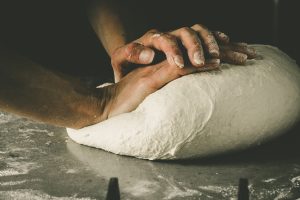The origin of ancient Roman pizza begins with a poem. Written between 29 and 19 BC, Virgil’s ancient epic, The Aeneid follows the story of the Trojan hero, Aenaes, who is ultimately responsible for founding Rome. Reading closely, this epic is the first documentation of Italy’s most infamous dish that we all know and love today.
Extract from Virgil, The Aeneid, Book 3:
“Italy is the land you seek?
You call on the winds to sweep you there by sea?
To Italy you will go. Permitted to ender port
but never granted a city girded round by ramparts,
not before some terrible hunger and your attack on us–
outrageous slaughter–drive you to gnaw your platters
with your teeth!”
–The Aeneid, Book III
This “platter” that Virgil mentions is actually a flat bread, which was used as a plate for the travelers’ meals. When the meal was complete, the platter itself became food for the starving Trojans. Virgil states that this bread plate was one of the first foods that Aenaes ate when he set foot on the Lazio coast of Rome. This evolved into the dish of ancient Roman pizza, where the flat bread became more than a platter; rather, it became an integral component of the meal.
The Roman Empire cultivated a recipe for this flatbread to make it healthy, versatile, and delicious. It was called pinsa, derived from the word “pinsere,” meaning “to press”. It is the mixture of water, grains, and salt, hand-pressed into an oval, and fermented for at least two days before cooking atop hot ashes and stone. The result? A delightfully crisp crust with a warm, soft center; the perfect foundation for fresh toppings such as olive oil, cheese, and herbs. With this ancient Roman pizza recipe, Romans swooned over their newfound love for flatbread. Pinsa was considered so divine, the priests offered it to the gods.
Thus, the Eternal City devised the dish that will live on forever, gracing dinner tables for centuries to come.
Pinsa: The Legend Lives On
Today, the legend of pinsa lives on, while staying true to its Roman roots. Culinary chefs take great care in hand-stretching and hand-pressing this divine dough, ensuring each product is artisanal and flavorful.
As modern day, factory-manufactured pizza becomes the norm in the United States, the craft of pinsere is now considered tedious to some. But for true artisans, carefully hand-pressing pinsa dough is essential to create an authentic experience. This process releases gases from the dough, creating air bubbles for a light, crisp texture. It also formulates an aromatic pizza base and has the perfect flavor profile to compliment every garnish—not overpowering, but exquisitely simple. Everyone craves its delicate crunch!
Combining ancient wisdom with modern flare, pinsa is chock full of high-quality ingredients and health benefits. With up to 80% hydration, a blend of non-GMO flours, and no added sugars or saturated fats, pinsa is light and easy to digest. It’s naturally vegan and gluten-friendly, so you can indulge without regret.
When it comes to the healthiest, tastiest, and best foundation for pizza, our Roman ancestors (thanks Virgil) knew what they were doing. After all, nothing tastes better than food that has been made with centuries worth of love.
Enamored with the practices of ancient Roman pizza? Try it for yourself! Read our blog, Pinsa Dough Tips for a Light and Fluffy Crust and impress your guests with artisanal Italian cuisine.
A Taste of Rome with Pinsa Romana America
We love bringing people together through great food. Pinsa Romana America is proud to offer Roman-style pizza crusts to families across the United States. Healthy, delicious, and customizable, this centuries-old recipe continues to enchant modern palates.
No fancy equipment is required when serving up our par-baked pinsa crusts. All you need is an oven and a passion for authentic food. Pinsa’s versatility knows no bounds, which is what makes it so great for families and restaurateurs. Simply top with fresh ingredients, pop in the oven for a few minutes, and presto! you’ve been transported to ancient Rome in one bite.


